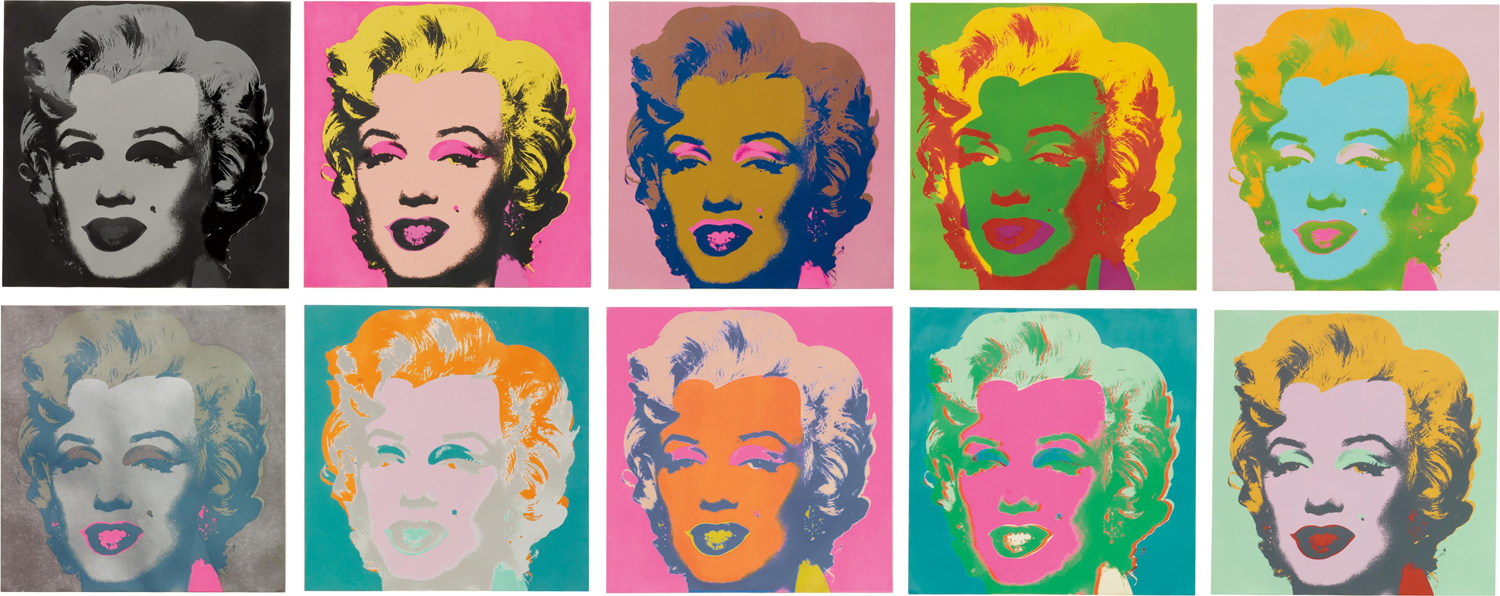Compare and Contrast
To cure jealousy is to see it for what it is, a dissatisfaction with self. Joan Didion
There was a time when, on the same date of each month, my husband James would come home from work and find me sitting on the couch, looking mean-spirited and morose. He'd muster his courage and sarcasm, and ask, "Did that art magazine arrive today? What's the matter…someone getting ahead of you?"
Andy Warhol, “Marilyn Monroe”, screen print on paper
My husband has a name for this affliction of jealousy and self-loathing that's so rampant in the field of art. He calls it, "Compare and Contrast," as in, "Compare and contrast yourself unfavorably to every other artist you know of, living or dead."
"Compare and Contrast" is a chronic condition in my professional field, painful and difficult to cure. Even financial success and public acclaim do not guarantee relief, since there’s always another artist out there richer, more esteemed, and more famous than you are.
Justin Mortimer, “Portrait of Queen Elizabeth”, oil on canvas
If you find yourself suffering from "Compare and Contrast," give a try to my three well-tested remedies:
1. Don't Believe Everything You Read
You know those super high-achieving individuals you encounter in the media, the ones who make you feel so defective? They aren't actually real. They're the airbrushed, polished, edited versions of flawed, messy, normal human beings like ourselves. Don't believe what you read in magazines, newspaper, blogs, or on social media about your fellow artists.
Yes, an art critic can write a review about an exhibit that's brutally honest. But usually what's printed (or videotaped) by art journalists or artists themselves is a public relations puff piece. You'll understand that best when the PR is written about you, and you have a hard time recognizing yourself.
Elizabeth Peyton, "Curt Cobain”, oil on canvas
2. Expand your Imaginative Space
Try this mental exercise: Visualize yourself in an expansive landscape with infinite acres to explore. Now invite in all the artists of the world. Why not? There's plenty of room for everybody here, and you can roam anywhere you want. Feels liberating, doesn't it?
Now imagine yourself not in that limitless field, but instead perched above or below all these artists on a steep ladder.
Which feels like more fun, running free across a wide open savanna or crouching down, trapped in an over-crowded tree house? Which feels better, hierarchy or equality? You can choose your relationship with other artists.
Hurvin Anderson, “Untitled (Red Flags), oil on canvas
3. Make Envy Your Teacher
At 30 I was a single mother trying to keep my painting going, and without much in the way of money or time. I could envy plenty about other young artists who seemed to be moving forward faster and straighter than I was. I was especially jealous of the ones who had gotten themselves to Europe to study and paint.
Chantal Joffe, Gertrude Stein (three portraits), oil on canvas
Why, I asked myself, have I been so unadventurous and unambitious? Why didn't I channel my inner Gertrude Stein, and sail across the ocean in pursuit of an artist's life in Paris after art school, instead of settling down in a half-renovated row house in Baltimore? I can laugh at my younger self now, but at the time my resentment towards those freer spirits was hard to bear.
What cured me was the wisdom of my husband, who said, Quit beating yourself and everyone else up, and just go! So I went to Rome with my best artist friend, and managed to stay for two months. Wandering that great city with my paints and sketchbook was a powerful antidote for corrosive envy and self-blaming.
Susan Abbott, “Things We Picked Up From the Street in Rome”, watercolor
I came home thankful to my family for holding down our home fort. And thankful for envy, because that horrible, powerful feeling had given me a direction to move in, and a kick in the pants to make a change. I've been back to Europe just about every year since.
Susan Abbott, “Sketchbooks”, pen and watercolor
Jealousy and envy are sharp spurs, and I'd much rather move myself along without the pain. Paraphrasing Joan Didion's words, I'd rather be more satisfied with myself, and accept that I'm always where I should be. And if that's out in a wide open field, running with the other hunter-gatherers, I'll be happy.
Your comments are welcome below! Feel free to leave your website link.






